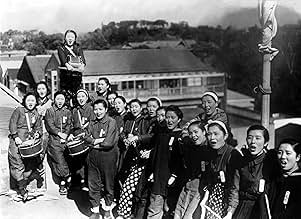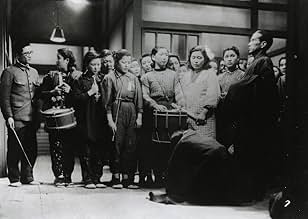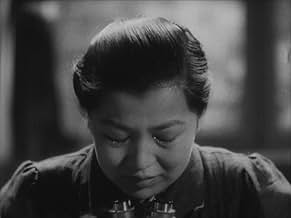NOTE IMDb
5,6/10
2,6 k
MA NOTE
Ajouter une intrigue dans votre langueWorld War II film about female volunteer workers at an optics plant who do their best to meet production targets.World War II film about female volunteer workers at an optics plant who do their best to meet production targets.World War II film about female volunteer workers at an optics plant who do their best to meet production targets.
Commentaire à la une
Typical of Japanese war-time propaganda, the film suggests that Japan's fascist ideology, its inculcation of fanatical obedience, its vast perpetration of unthinkable atrocities in a systematic manner, and its aggressive military expansionism can all be replaced by Japan's supposed victimization. Rather telling in this respect is the song that the girls repeatedly sing to boost morale, a song that recalls that barbarian Mongol conquerors once tried to invade Japan from China, but that the perpetrators of such heinous deeds of aggression could not possibly co-exist under the same sky with the innocent and pure Japanese-- this, of course, is being sung during a war that was begun when an utterly unprovoked Japan invaded China and slaughtered untold numbers of its population mercilessly.
All of this would be something that one could simply shrug off as the past blindness of war, but films such as these are more disturbing today than, say, Triumph of the Will because while Germany was forced to confront the horrors it had unleashed upon the world, most Japanese films even today (and textbooks for that matter) still tend to view Japan as a victim in the war (see, for instance, Kurosawa's own Rhapsody in August so many decades later). Assisted by the policies of the American post-war occupation, Japan has never had to come to terms with what it did to the planet, and what in human history can possibly more disturbing than a lack of accountability for the worst sins humanity can commit? And by the way, I say all of this despite the fact that Kurosawa is probably my favorite director.
All of this would be something that one could simply shrug off as the past blindness of war, but films such as these are more disturbing today than, say, Triumph of the Will because while Germany was forced to confront the horrors it had unleashed upon the world, most Japanese films even today (and textbooks for that matter) still tend to view Japan as a victim in the war (see, for instance, Kurosawa's own Rhapsody in August so many decades later). Assisted by the policies of the American post-war occupation, Japan has never had to come to terms with what it did to the planet, and what in human history can possibly more disturbing than a lack of accountability for the worst sins humanity can commit? And by the way, I say all of this despite the fact that Kurosawa is probably my favorite director.
- Local Hero
- 26 mars 2010
- Permalien
Histoire
Le saviez-vous
- AnecdotesIn order to save film during wartime, the Japanese government ordered films to be released to have no opening titles and thus giving no credit to most of the actors or workers on each film. This included "The Most Beautiful" (1944).
- ConnexionsReferenced in Kurosawa: The Last Emperor (1999)
Meilleurs choix
Connectez-vous pour évaluer et suivre la liste de favoris afin de recevoir des recommandations personnalisées
- How long is The Most Beautiful?Alimenté par Alexa
Détails
- Durée1 heure 25 minutes
- Couleur
- Mixage
- Rapport de forme
- 1.37 : 1
Contribuer à cette page
Suggérer une modification ou ajouter du contenu manquant

Lacune principale
By what name was Le Plus dignement (1944) officially released in Canada in English?
Répondre




























